Illegal Gold mining outbreaks in Amazonian indigenous lands
The indigenous lands of Kayapó, in Pará, house mining fronts with an area equivalent to dozens of soccer fields. Photo from Planet Labs
A significant expansion of illegal Gold mining outbreaks in Amazonian indigenous lands is destroying the rainforest at an accelerated rate in Brazil, which began to emerge since January of this year. This is confirmed by the satellite images analysed by BBC News Brazil.
The indigenous and environmentalists are critically concerned with this development occurring in different parts in the states of Pará and Roraima, in the north of Brazil, the mining activity has increased since the public statements and hate speech of President Jair Bolsonaro against indigenous people and in favour of the exploitation of minerals in indigenous lands and what they consider a weakening in the fight against environmental crimes by the government.
The mining invasion of one of these reserves in the Amazon has also resulted in a murdered indigenous leader of the Wajãpi tribe , which occurred following a plea for help from the leader, that miners had entered their territory with guns and weapons.
The Wajãpi indigenous community who reside in the west of the state of Amapá, reported last Saturday that a group of miners assassinated Emyra Wajãpi last wednesday. The indigenous leader, Wajãpi ´s death was the beginning of an attack to the Mariry village that took place between Friday and Sunday with the invasion of 50 gold seekers to the place.
The Coordination of the indigenous Organizations of the Brazilian Amazon (COIAB) issued a statement condemning the invasions and showing their solidarity with the Wajãpi people.
“The Coordination of the indigenous Organizations of the Brazilian Amazon (COIAB), together with its base organizations on a state, regional and local level, mainly with the APOINAP (Articulation of Indigenous Peoples and Amapá and Northern Pará Organizations), are here to express publicly their complete solidarity and support for the Waiãpi indigenous people, in lieu of the recent events in which metal seekers invaded their territory, while we express our deep and vehement repulsion towards this kind of action, that has intensified itself, fomented mainly by intransigent and irresponsible, authoritarian, judgemental, arrogant and disrespectful positions of the current government, especially from the president of the republic Jair Bolsonaro, for the attacks he has been making against the rights of the people of this country, especially the territorial rights already guaranteed in completely demarcated and regularized indigenous lands in light of the Constitution of the Federal Government of 1988 and which this government is constantly trying to set back.” - Reported to Latin American News
Opening these ancestral protected lands to mining and other extraction industries such as oil and gas drilling have devastating consequences for indigenous communities and irreversible ecological devastation such as mercury poisoning of the Amazon waterways which people use to fish and bath in.
Previous affected indigenous people were also the Yamomami people in on-going illegal gold extraction in 2013 and before.
The deforestation of the Amazon has accelerated with the arrival of Bolsonaro to the presidency of Brazil, since the president has been encouraging racial discrimination and persecution of indigenous people in the Amazon whose lives and ancestral lands are being destroyed and threatened by mining and oil extraction.
The mine outbreak occurred at a time when the National Space Research Institute (INPE) has claimed that there is a high rate of destruction in the Amazon, which has been questioned by President Bolsonaro, who said the publication of data on deforestation could affect the country's international negotiations.
The images evaluated by the BBC are from Planet Labs , an American company that orbits more than 100 satellites and takes daily photographs of the world.
Illegal gold mining in the Indigenous Land Kayapó, Pará, in July 2019. The clearest points indicate recent activity.
The activity was monitored in three of the Brazilian indigenous lands that suffer the most illegal gold extraction: Kayapó, Munduruku (both in Pará) and Yanomami (in Roraima and Amazonas). The three territories occupy an area equivalent to that of the state of São Paulo and house some of the most conserved sections of the Brazilian Amazon.
In three Brazilian Amazon territories, there was an increase in these areas of mining extraction to reopen old mines, some created more than a decade ago - and in those created more recently.
The satelite photographs were sent to two satellite imagery specialists: to geologist Carlos Souza Jr. of Imazon (a non-profit organization dedicated to the conservation of the Amazon rainforest); and to the geographer of the business intelligence software Arcplan, Marcos Reis Rosa.
Both confirmed that the mines are expanding their gold extraction activities. Some are even occupying areas the size of dozens of soccer fields.
Gold in Yanomami
In June, the BBC published a report that showed that in 2019, gold became the second most exported product in the Roraima area , although none of the mines operate legally.
Officials are investigating whether the metal has been illegally extracted from the territory in Yanomami, where, according to the natives, at least 10, 000 miners are currently operating.
The executive coordinator of the Association of Indigenous Peoples of Brazil (Apib), Sonia Guajajara , says that indigenous people from different parts of the Amazon have reported "an absurd increase" in mining companies since the beginning of the Bolsonaro government, this is due to Bolsonaro´s hate speech against indigenous people and encouragement of mining in these areas, desperation is increasing as Brazil on the verge of recession.
While Bolsonaro served as a federal deputy and, later in his presidential career, he repeatedly said he agreed with the economic exploitation of these territories to improve the living conditions of indigenous communities, but this doesn´t improve their lives or living standards, their land is illegally taken from them and their Amazon waterways and fish are killed and polluted with mercury and other toxic poisons.
The 1988 Constitution provides for the exploitation of minerals in indigenous lands as long as it is regulated. But as laws in this field have never been passed, the activities are continuously illegal.
Since 1996 , Congress has tried to pass a bill to regulate mining in indigenous lands. Now, the Bolsonaro government is trying to unlock the agenda.
"Bolsonaro is making Brazil the exterminator of the environmental future": the harsh message of 8 former Brazilian environment ministers
However, according to Sonia Guajajara, the vast majority of Brazilian indigenous communities oppose the regulation of the activity because they fear their social and environmental impacts.
At the end of 2018, Amazon's geo-referenced socio-environmental information network - which brings together eight environmental NGOs from Latin America - published a report on threats to the Amazon. The document identified illegal mining on 18 indigenous lands in Brazil. There is also a prior report written by Jasmine Plummer investigating the environmental laws on this activity and how it affects the from 2007
In some territories, rafts are installed on the Amazon riverways, to look for precious metals in the riverbed. In addition to the rafts, industrial machinery such as backhoes and dredgers form Deforested craters in the forest. This is the case of many of the mines in the Tapajós de Pará region , where satellite images exhibit important "scars" open in the forest.
In addition to logging, the activity causes sedimentation of rivers , diverting their courses and creating artificial lakes that become breeding grounds for mosquitoes. Not by chance, malaria is common in the mining areas of the Amazon.
In some areas the damage is permanent, with no possibility of complete regeneration.
"Scars" caused by the extraction of gold in the Tapajós de Pará region, in an image taken in July 2019.
Gold mining is also associated with an increase in conflict, increasing human trafficking, prostitution and disease in the indigenous areas where it operates.
For forest engineer Paulo Barreto, an associate researcher at Imazon, deforestation in the Amazon has been stimulated not only by Bolsonaro's statements, but also by the weakening of regulatory environmental agencies.
"It has created a climate where everything and anything goes, and people think it will not be punished," Barreto told the BBC.
By order of Environment Minister Ricardo Salles, the annual budget of Ibama, the main federal environmental agency, was reduced by US $ 23.57 million this year, a quarter of the total.
Meanwhile, destruction of the Brazilian Amazon has doubled in just a few years from 7%, in 2008, to 13%, in 2017. Data released in 2018 by the Instituto Nacional de Pesquisas Espaciais – INPE (National Institute of Spatial Research)
The indigenous lands of Kayapó, in Pará, have mining activities which have destroyed with an area equivalent to dozens of football fields.
This week President Bolsonaro was again criticized by environmentalists. After the president insisted that deforestation figures released by the National Space Research Institute (INPE) were a lie and could hamper Brazil's negotiations with other countries, such as those related to the trade agreement between Mercosur and the European Union .
European leaders have expressed concern about the increase in deforestation in Brazil and Bolsonaro's actions in the environmental sector.
In April, a letter published in the journal Nature signed by 607 scientists and two indigenous organizations criticized the Bolsonaro government for "working to dismantle deforestation policies."
The signatories of the document denounce that "the new administration of Brazil threatens indigenous rights and natural areas."
In the words of the Yanomami’s foremost
shaman-activist, Davi Kopenawa Yanomami-
The Earth cannot be split apart as if the forest were just a leftover part. With leftover trees and leftover rivers, leftover game, fish and humans who live there, its breath of life will become too short. That is why we are worried. We shamans simply say we are protecting nature as a whole thing. We defend the forests’ trees, mountains and rivers, its fish, game, spirits and human inhabitants.
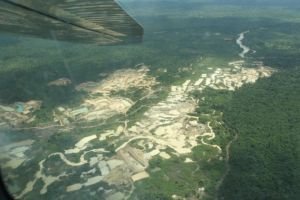
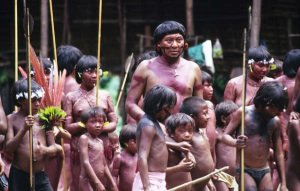
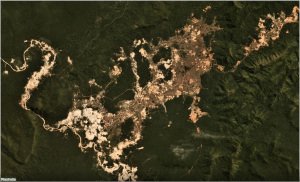
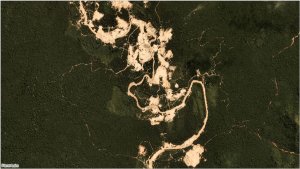
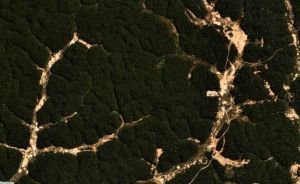
Yet we all sit back and let this happen to worries about BS like Brexit. So sad 💯🐒